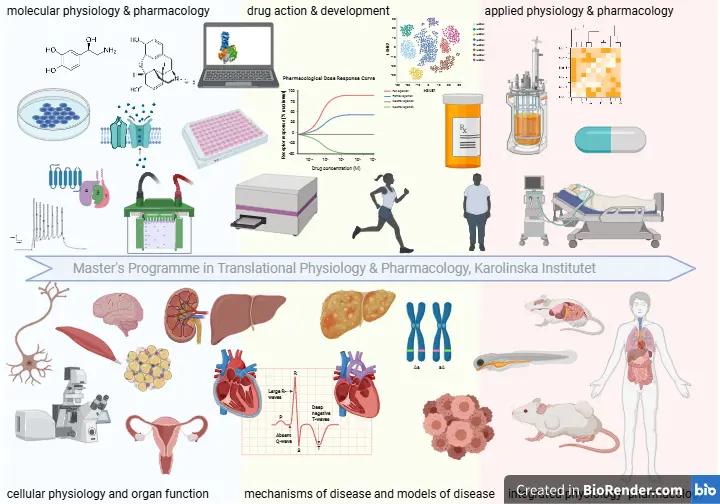For students attending the The Master's Programme in Translational Physiology and Pharmacology Programme outline and study plan 4FF26
Programme outline and study plan 4FF26

Programme outline Syllabus 4FF26
The Master's Programme in Translational Physiology and Pharmacology gives students an integrated knowledge of human physiology, pathology, and pharmacology with emphasis on mechanism-based therapies and drug development in a truly translational approach. The obtained skill set at the crossing of academia, applied science and industry is key to understanding human diseases and their treatments rendering the students attractive and highly employable with the utmost potential to improve global health.
Programme overview
The first semester provides a foundation in integrated physiology and pharmacology, while the second semester focuses on computational analysis, experimental methodologies and model systems, and practical applications and scientific communication. The third semester includes elective courses and a research project in collaboration with an academic lab or a Life Science company. The program ends with the thesis project (alternative 1). Students also have the option to take a 45-credit thesis, combining the research project and the thesis in one course (alternative 2).

Courses
Semester 1:
4FF015 Integrated Physiology and Pharmacology - 30 credits, week 1-20.
Semester 1 provides a foundation in integrated physiology and pharmacology so that students later in the programme will be able to benefit from practical components and transfer physiological and pharmacological principles to academic and clinical settings. Course components range from molecular and cell-based physiology and mechanism-oriented pharmacology to organ-based physiology, pathophysiology, and disease treatment. The course also includes activities related to career development, ethical considerations, professional attitudes, and sustainability from a global perspective, with a continuous progression of these topics throughout the programme.
Semester 2:
All the new syllabus for Semester 2 is not yet formally approved. However, the structure and content will remain very similar to the current version (programme code: 4FF22). You can use the existing course syllabi as a guide.
4FF016 Computational modelling in pharmacogenomics and drug development 7,5 credits, week 1-5.
Short course overview: This course in computational modeling lays the foundation to perform basic computer-driven analyses, build models and simulations, and manage large datasets. . You will learn how protein modelling and analysis of complex data sets can support drug discovery and precision medicine.
4FF017 Methodological approaches in physiology and pharmacology 15 credits, week 6-15.
Short course overview: This course is designed to provide broad knowledge in experimental methodologies and relevant model systems crucial for research in translational physiology and pharmacology. It focuses on experimental methods in physiology and pharmacology and provides both theoretical knowledge and hands-on experience with techniques commonly used to study biological mechanisms and drug effects.
4FF018 Practical applications and scientific communication 7,5 credits, week 16-20.
Short course overview: This course focuses on practical applications and scientific communication for students to develop practical skills and interdisciplinary communication abilities.
(Previously. Project work in translational physiology and pharmacology)
Semester 3:
Semester 3 includes 15-credit, second-cycle elective courses. The purpose of the elective courses is to allow students to expand their knowledge in a variety of areas, such as information literacy, laboratory animal science, GCP, advanced human research, omics and receptor pharmacology.
During year one of the programme, we will give you more information and individual guidance regarding this opportunity and how to apply.
Elective courses offered by the Department of Physiology and Pharmacology:
Laboratory animal science, behavior and metabolism 7.5 credits, week 1-5
Searching, Writing and Presenting Science and Information Literacy 4 credits, week 1-2,5
GCP and Clinical Pharmaceutical Trials 3,5 credits, week 2,5-5
Advanced Human physiology Research, 7,5 credits, week 6-10
Advanced Receptor Pharmacology 4 credits, week 6-7,5
Omics in science - bioinformatic analysis and visualization of gene regulation 3,5 credits, week 7,5-10
Alternative 1
Semester 3:
4FF018 Research project in applied physiology and pharmacology 15 credits, week 11-20.
Short course overview: Previously, the project component (weeks 11–20) was offered as two separate 7.5-credit courses. The course aims to strengthen students’ skills in applying subject-specific knowledge to basic research.
(Previously; Applied physiology and pharmacology - research project 1 7,5 credits and Applied physiology and pharmacology - research project 2 7,5 credits )
Semester 4:
4FF019 Degree project in translational physiology and pharmacology 30 credits, week 1-20.
Short course overview: In this course, you will deepen your knowledge in translational physiology and pharmacology. Through the degree project, you will learn how to connect theory with research results, formulate scientific questions, choose suitable methods, and contribute to new insights in the field.
(Previously: Degree project in translational physiology and pharmacology )
Alternative 2
Semester 3-4:
There will be a possibility to merge the Research project in applied physiology and pharmacology with the Degree project in translational physiology and pharmacology from semester 4.
4FF020 Degree project in translational physiology and pharmacology 45 credits, week 11-20 semester 3 and week 1-20 semester 4.
Short overview: The degree project can be extended to 45 credits, beginning in the later part of Semester 3. This means that the student can choose to merge it with the Research project in applied physiology and pharmacology (15 credits, week 11-20).
(Previously: Degree project in translational physiology and pharmacology)
Academic calendar
The academic year is divided into two semesters. The autumn semester begins in late August and ends in mid-January; the spring semester begins in mid-January and ends in June. The start- and end dates of each semester are:
Autumn semester 2026 2026-08-31 - 2027-01-17
Spring semester 2027 2027-01-19 - 2027-06-06
Autumn semester 2027 2027-08-30 - 2028-01-16
Spring semester 2028 2028-01-17 - 2028-06-04
